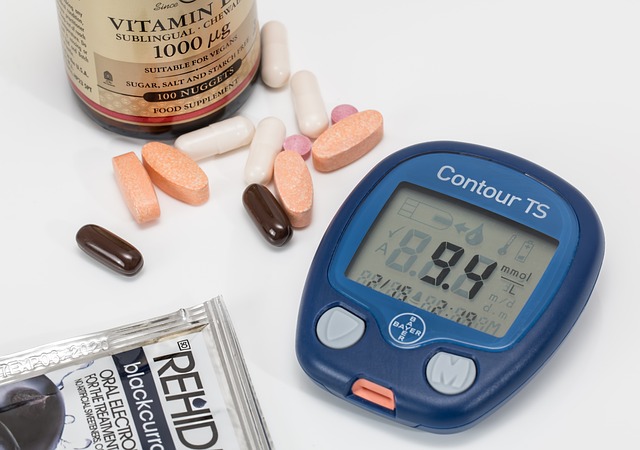Vitamin B12 deficiency, often overlooked, affects high-risk individuals with symptoms like fatigue, neurological issues, and memory loss. The UK's standard thyroid blood test includes B12 levels due to its crucial role in health. High-risk groups include vegetarians, aging adults, and those with gastrointestinal conditions. Imbalances in thyroid hormones can indicate nutrient deficiencies, prompting tests for hypothyroidism and B12 deficiency. Interpreting B12 blood results is vital; low levels may require dietary changes, supplements, or injections. Regular follow-ups with UK standard thyroid blood tests monitor treatment effectiveness.
Detecting Vitamin B12 deficiency is crucial for maintaining overall health. This article guides you through the process, focusing on blood tests as a key diagnostic tool in the UK. We explore symptoms and risk factors, highlighting how they can mimic other conditions. Additionally, we delve into the role of standard thyroid blood tests in identifying B12 deficiencies, offering insights into interpreting results tailored to UK residents. Knowing when to take action is vital; let’s unravel these complexities together.
- Understanding Vitamin B12 Deficiency: Symptoms and Risk Factors
- The Role of Thyroid Blood Tests in Diagnosing Deficiency
- Interpreting Results and Recommended Next Steps for UK Residents
Understanding Vitamin B12 Deficiency: Symptoms and Risk Factors
Vitamin B12 deficiency is a common but often overlooked health issue, especially in individuals who may be at higher risk. Understanding its symptoms and risk factors is crucial for early detection, as timely intervention can prevent severe complications. Key indicators include fatigue, weakness, memory loss, and neurological issues like tingling or numbness in the hands and feet. These symptoms are non-specific and often resemble other conditions, which is why identifying a deficiency through accurate testing is essential.
In the UK, a standard thyroid blood test typically includes measures of B12 levels, as it plays a vital role in overall health. Individuals at higher risk include those with poor diet, especially vegetarians or vegans who don’t consume animal products rich in B12. Age is also a factor; absorption decreases with age, and older adults may require more frequent testing. Other risk factors include certain medical conditions like pernicious anemia, where the body doesn’t produce enough of the intrinsic factor needed for B12 absorption, as well as those who have had gastrointestinal surgery or take medications that can interfere with B12 absorption.
The Role of Thyroid Blood Tests in Diagnosing Deficiency
Thyroid blood tests play a crucial role in diagnosing vitamin B12 deficiency, offering valuable insights into overall health. In the UK, the standard thyroid blood test typically measures levels of thyroxine (T4) and triiodothyronine (T3), hormones produced by the thyroid gland that regulate metabolism. Imbalances in these hormones can indicate underlying issues, including nutrient deficiencies like B12.
When a vitamin B12 deficiency is suspected, healthcare professionals often incorporate thyroid function tests into the evaluation. This is because hypothyroidism, or an underactive thyroid, can contribute to B12 absorption problems. By assessing both B12 levels and thyroid hormone markers, doctors can better pinpoint the root cause of any deficiencies, ensuring more effective treatment strategies for optimal health outcomes.
Interpreting Results and Recommended Next Steps for UK Residents
Interpretation of results is a crucial step in understanding your Vitamin B12 deficiency status. If your blood test reveals low levels of Vitamin B12, it indicates a potential deficiency. Your doctor will consider various factors to interpret these results, including age, diet, and overall health. In the UK, a common reference range for Vitamin B12 is between 140 and 700 pg/mL (picograms per millilitre), but this may vary slightly between labs.
For UK residents, if the test indicates a deficiency, the next steps are essential for effective treatment. Your healthcare provider might recommend dietary changes, such as ensuring adequate intake of Vitamin B12-rich foods or considering supplements. They may also prescribe intramuscular injections of Vitamin B12 to rapidly raise your levels. Regular follow-up UK standard thyroid blood tests will be necessary to monitor the success of treatment and adjust the plan accordingly.
Vitamin B12 deficiency can often be overlooked, but early detection through blood tests is crucial. Understanding the symptoms and risk factors, alongside the role of thyroid blood tests, enables individuals in the UK to take proactive steps. Interpreting test results accurately is key; if deficient, seeking medical advice for appropriate treatment is essential. Regular UK standard thyroid blood tests can help monitor your health and prevent potential complications.
